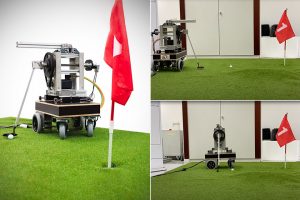Roli says it’s not done trying to re-invent the keyboard, announces Seaboard Rise 2


Music hardware startup Roli says it’s not giving up on the line of squishy Seaboard keyboards that launched its brand. Despite reports last year that the company was pivoting to focus on educational and subscription products, Roli today announced the Seaboard Rise 2 — an upgrade to the more compact model in its Seaboard range.
“It’s lots of small improvements that collectively make it into a much, much better product,” Roli CEO Roland Lamb told The Verge. “In a way, this is the product I’ve always wanted to launch. It’s very, very complete.”
“this is the product I’ve always wanted to launch”
Upgrades to the Rise 2 include new internal engineering, a refreshed port structure, and a more durable, platinum blue chassis. The big change, though, is the addition of frets to the keyboard’s playing surface — subtle ridges running down the center of each key.
Offering users a keyboard with a smooth, continuous playing surface has always been the appeal of the Seaboard range. It’s this feature (combined with supporting software) that allows musicians to blend and bend notes on a Seaboard like they would on a guitar. But Lamb says this also made the instrument difficult for some players, meaning they had to rely too much on vision to hit the right note, rather than feeling their way from key to key. The new frets, he says, offer a physical map that solve this problem.
“It’s a relatively small change but it’s a hugely impactful change, in terms of how people play, and precision, and getting started,” says Lamb.
The bigger story for Roli, though, is not the Rise 2 but the company’s long-term trajectory. Since it was founded in 2009, Roli has launched a number of products, starting with its Seaboard range of keyboards before expanding with the modular beat-making Blocks and the Guitar Hero-for-piano keyboard Lumi. But the company struggled to grow in line with VC expectations, and last year went into administration (similar to bankruptcy in the US), relaunching as “Luminary” to focus on education and Lumi. Why? Because Lumi is a cheap-ish keyboard with a subscription model that makes it easier to deliver revenue growth.
Now, though, Lamb says the company — technically called “Luminary Roli” — isn’t finished with its original vision: to deliver a new musical instrument. He just says such work needs patience. “Developing new instruments that succeed takes time,” says Lamb. “An instrument is a cultural object in which you need to have a whole bunch of pieces come together: the music people make, the artists who use it and teach it, and the hardware and software and protocols.”
Lamb says Roli “misjudged the amount of time it would take for the ecosystem to come together around the Seaboard,” but that the Rise 2 should make adoption easier. Not only do the keyboard’s frets make it easier to play, he says, but there’s more widespread adoption of the MPE Midi format, which is needed to properly record and edit its music.

Lamb speaks convincingly of the challenges of launching an instrument like the Seaboard. “It’s extraordinarily rare for there to be a new form of musical gestural interaction that is proposed and successful,” he says. But it also seems that the announcement of the Rise 2 had as much to do with pragmatism as anything else. Lamb says most of the work on the keyboard was complete by the time Roli went into administration, and when I ask if the company is currently working on future Seaboard products, he doesn’t answer directly.
“The long term question is, what is a fully digital world of music going to look like?”
Instead, he says he sees Roli’s interest in instruments as complementary to its educational products, which try to teach the piano without using traditional sheet music notation. “Music has two sides to it. It has a learning and development side, and a performance and playing side,” he says. “The long term question is, what is a fully digital world of music going to look like?”
Lamb’s suggestion is that Roli can offer something for both sides of this equation: not only a new instrument that is digital-first, but educational products that will raise a generation of new musicians without ties to traditional learning methods. He says: “We will keep going with the Seaboard, we’re committed to it. But we’ll just let it go nice and slow, be patient about it. Then in terms of growth investments, in the present, the focus will be on Lumi.”
The Seaboard Rise 2 is available to preorder at Roli.com for $1,399 (£1,099, €1,299). Roli says it has “limited availability” for the keyboard in 2022 and is not offering shipping dates.







